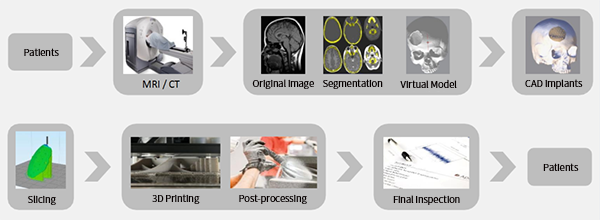After years of clinical trials, PEEK implants manufactured by 3D printing process have shown many characteristics in terms of safety, efficacy and reliability. PEEK material has high biocompatibility and is harmless to living tissue, and patients can be examined by CT and MRI after surgery. Produced by 3D printing process, passive implants acting on bones, joints and oral hard tissues are safe and reliable.
PEEK implants offer three outstanding advantages
01、Long-term stability of PEEK implants
The elastic modulus of PEEK is close to the elastic modulus of cortical bone, especially the elastic modulus of carbon fiber reinforced PEEK is more matched with the elastic modulus of cortical bone. This close or matching elastic modulus weakens or eliminates the stress shielding effect to a certain extent, which is beneficial to the osseointegration between the implant and the bone tissue, and ensures the long-term stability of the PEEK implant.
02、PEEK for Trauma/Spine/Joint
PEEK is transparent to X-ray, CT or MRI scans without artifacts, making it easier to monitor bone growth and healing processes. In addition, PEEK also has the characteristics of good biocompatibility, wear resistance, fatigue resistance, corrosion resistance, easy processing, etc., and the PEEK material is relatively light. The above advantages make PEEK widely used in the fields of trauma, spine and joints.
03、PEEK is a traditional implant replacement material
Compared with stainless steel, titanium alloy and ultra-high molecular weight polyethylene implants, PEEK and its composites have good wear resistance, which can effectively avoid problems such as peri-implant inflammation and osteolysis caused by wear particles. Therefore, PEEK is considered as one of the candidate materials to replace traditional implants in the application of orthopedic implants.
Apium Bio-PEEK Material 3D Printer
The Apium M220 is a 3D printer designed for the manufacture of medical products and PEEK implants. Personalized orthopaedic implants can be produced by 3D printing to meet clinical and scientific needs (material engineering, biological tissue engineering).
Workflow for 3D Printing PEEK Implants

The patient undergoes conventional magnetic resonance imaging (MRI) or computed tomography (CT) equipment to read images, and processes the two-dimensional data to obtain three-dimensional data. The system then generates an easy-to-print 3D model and sends it to the Apium M220 printer. Finally, the high-performance polymer polyetheretherketone (PEEK) is used as the raw material for printing, and the printed product is subjected to post-processing and quality inspection.
APIUM M220 real case sharing
The following cases were completed by APIUM and LUCID Implants. LUCID Implants is an India-based medical technology company that provides patient-specific implant solutions. At LUCID, they design, develop, manufacture and sell oral and maxillofacial (OMF) and neurosurgical implants. Customized in different sizes and shapes. To fit each patient's unique anatomy.

Case 1: Trauma/accident
The patient experienced an accident that resulted in a fracture of his frontal bone. He suffered a fractured frontal bone resulting in a pronounced depression above his right eye.
Patient self-reports after surgery
"One week after the operation, I was back to my normal life. My hospital stay was only 2 days. I am very grateful to my doctor."

Case 2:mandibular inlay graft
The patient had a markedly unnatural face, especially the mandible, due to a birth defect. It also causes problems with breathing, sleep, general oral hygiene, and psychology.
Patient self-reports after surgery
"I'm very happy with the results of my surgery. I feel like I can face the world with confidence and dignity. It's a great feeling!"

Case 3: Tumor
The patient had myeloblastoma (demyelination), which is a dense tissue of collagen on the right side of the mandible.
Patient self-reports after surgery
"I'm so grateful for the doctors who changed my life. I can start a new life again!"
Although PEEK is widely used in medical applications, it is recognized in the industry that PEEK materials are difficult to print. Even some international 3D printing giant companies have been slow to launch their own PEEK 3D printing. Our company has a complete set of data analysis and 3D printing solutions (Amira software & Apium printer) for medical PEEK implants.





























 Home
Home Telephone
Telephone Message
Message







